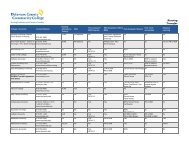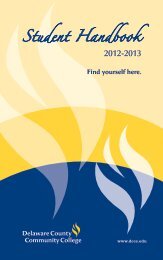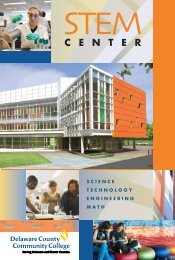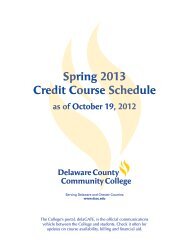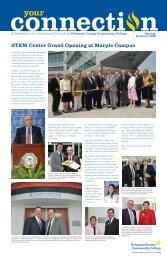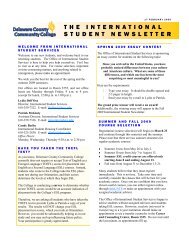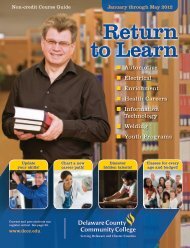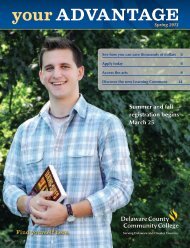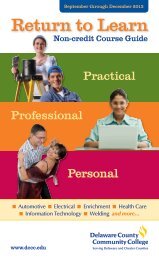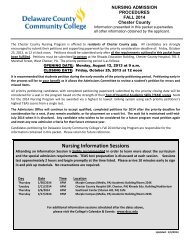2010 Catalog - Delaware County Community College
2010 Catalog - Delaware County Community College
2010 Catalog - Delaware County Community College
Create successful ePaper yourself
Turn your PDF publications into a flip-book with our unique Google optimized e-Paper software.
54 CAREER PROGRAMS, ASSOCIATE DEGREE<br />
Health problems that can interfere with the applicant's ability to demonstrate<br />
achievement of program competencies are considered individually.<br />
Upon successful completion of this program, students should be able to:<br />
• Administer therapeutic medical gases.<br />
• Administer cardiopulmonary resuscitation.<br />
• Provide appropriate mechanical assistance to support respiration<br />
when necessary.<br />
• Administer drugs that are given through inhalation procedures.<br />
• Maintain all equipment used in respiratory support.<br />
• Perform diagnostic pulmonary function testing and blood-gas analysis.<br />
• Exercise judgment and accept responsibility in therapeutic procedures<br />
based on observation of patients and knowledge of anatomy, physiology,<br />
pharmacology and clinical medicine.<br />
Students must progress through the curriculum in sequence. Students must<br />
maintain a GPA of 2.0 to remain in the program. Credits for BIO 117 or BIO<br />
150 and BIO 118 or BIO 151 must be current within five academic years of<br />
the date of beginning the program. Students must achieve a grade of “C” or<br />
better in BIO 117 or 150, BIO 118 or 151 and CHE 110.<br />
Admission to the program is dependent on achieving the satisfactory scores<br />
on the Health Occupations Basic Entrance Test (HOBET); and additionally<br />
meeting minimum SAT/ACT requirements or a GPA of 2.5 in certain “prerequisite”<br />
courses (see the DCCC Admissions office description of the special<br />
admission requirements and procedure section).<br />
Any remediation in English and reading must be satisfied before beginning<br />
the program. Students who fail or withdraw from a respiratory therapy course<br />
and wish to repeat said course must:<br />
∑ Have a GPA of 2.5.<br />
∑ Petition for readmission is made through the Respiratory Therapy<br />
department, not the <strong>College</strong> Admissions office. Readmission to the program is<br />
on a space available basis and only if the student can graduate within two<br />
years of his/her initial class. If a student is granted reentry into the program at<br />
his/her exit point, an objective evaluation will be used to determine if the<br />
placement of the student within the curriculum is appropriate. Upon<br />
readmission to the program, the student must complete the program within<br />
two years following the graduation of his/her initial class.<br />
The Respiratory Therapy program is accredited by the Committee on<br />
Accreditation for Respiratory Care (CoARC), 1248 Harwood Rd., Bedford,<br />
Texas, 76021-4244, 817-283-2835, www.CoARC.com.<br />
The Pennsylvania State Board of Medicine reserves the right to deny a<br />
license to any candidate who has been convicted of a felony or any offense<br />
relating to the use or sale of alcohol or controlled substances in Pennsylvania<br />
or any other state.<br />
In addition to normal tuition and fees, respiratory therapy students are<br />
required to purchase uniforms, insurance and miscellaneous supplies.<br />
Upon completion of the two-year program with a grade of "C" or better in<br />
all respiratory therapy courses, the degree of associate in applied science is<br />
awarded. The graduate is immediately eligible for the Entry-Level Certification<br />
Examination and after passing the Entry-Level Certification Examination, the<br />
student is eligible for the Advanced Practitioner's Examination. Upon<br />
successful completion of the Advanced Practitioner's Examination, the<br />
credential Registered Respiratory Therapist is awarded.<br />
Pre-Requisite Courses<br />
Credits<br />
ENG 100 English Composition I . . . . . . . . . . . . . . . . . . . . . . . . . . . . . . . . . 3<br />
MAT 100 Intermediate Algebra . . . . . . . . . . . . . . . . . . . . . . . . . . . . . . . . . . 3<br />
CHE 110 General Chemistry I with lab . . . . . . . . . . . . . . . . . . . . . . . . . . . . 4<br />
First Year, First Semester<br />
Credits<br />
RTH 100 Respiratory Therapy Principles I . . . . . . . . . . . . . . . . . . . . . . . . . 4<br />
RTH 101 Respiratory Therapy Practicum I . . . . . . . . . . . . . . . . . . . . . . . . . 4<br />
BIO 150 Human Anatomy and Physiology I . . . . . . . . . . . . . . . . . . . . . . . 4<br />
ENG 112 English Composition II. . . . . . . . . . . . . . . . . . . . . . . . . . . . . . . . . 3<br />
15<br />
First Year, Spring Semester<br />
RTH 102 Respiratory Therapy Principles II. . . . . . . . . . . . . . . . . . . . . . . . . 2<br />
RTH 103 Respiratory Therapy Practicum II . . . . . . . . . . . . . . . . . . . . . . . . 6<br />
BIO 151 Human Anatomy Physiology II . . . . . . . . . . . . . . . . . . . . . . . . . . 4<br />
PSY 140 General Psychology . . . . . . . . . . . . . . . . . . . . . . . . . . . . . . . . . . . 3<br />
15<br />
First Year, Summer I Semester<br />
RTH 104 Respiratory Therapy Summer Clinical I . . . . . . . . . . . . . . . . . . . . 5<br />
First Year, Summer II Semester<br />
RTH 105 Respiratory Therapy Summer Clinical II . . . . . . . . . . . . . . . . . . . 5<br />
Second Year, Fall Semester<br />
RTH 200 Respiratory Therapy Principles III . . . . . . . . . . . . . . . . . . . . . . . . 3<br />
RTH 201 Respiratory Therapy Clinical Practicum III. . . . . . . . . . . . . . . . . . 6<br />
RTH 204 Pulmonary Pathophysiology Clinical Rounds I . . . . . . . . . . . . . . 2<br />
AHM 220 Applied Microbiology. . . . . . . . . . . . . . . . . . . . . . . . . . . . . . . . . . 1<br />
12<br />
Second Year, Spring Semester<br />
RTH 202 Respiratory Therapy Principles IV . . . . . . . . . . . . . . . . . . . . . . . . 3<br />
RTH 203 Respiratory Therapy Clinical Practicum IV. . . . . . . . . . . . . . . . . . 6<br />
RTH 205 Pulmonary Pathophysiology Clinical Rounds II . . . . . . . . . . . . . 2<br />
________ Humanities Elective . . . . . . . . . . . . . . . . . . . . . . . . . . . . . . . . . . . 3<br />
14<br />
Second Year, Summer I Semester<br />
RTH 206 Respiratory Therapy Summer Clinical III. . . . . . . . . . . . . . . . . . . 4<br />
Total Credits Required: 80<br />
Small Business Management, Associate in<br />
Applied Science (BUSC)<br />
The Small Business Management program is designed to prepare students in<br />
both operational and skill aspects of the small enterprise. Such preparation will<br />
equip students with specific areas of skills or management to either enter an<br />
existing small firm or begin their own entrepreneurial enterprise.<br />
Courses are designed so that the student, through logical steps, understands<br />
the principles unique to small business operation. The 60-61 credit program<br />
leads to the awarding of the associate in applied science degree.<br />
Practical knowledge in small business management, finance, marketing,<br />
sales, advertising and supervision are designed to prepare students for entrylevel<br />
needs. Generally, transfer is not intended through this program. The<br />
associate dean, business/computer information systems, should be consulted<br />
when considering use of credits for transfer. <strong>College</strong>-sponsored Experiential<br />
Learning may be taken for credit while working in a small business with<br />
specific managerial duties.<br />
Upon successful completion of this program, students should be able to:<br />
• Use terms and tactics within the small business environment.<br />
• Be able to develop a marketing plan.<br />
• Analyze and resolve problems involving financial statement comparisons.<br />
• Create advertising promotions appropriate to the small business.<br />
• Demonstrate the skills necessary to operate office equipment commonly<br />
used in the small company.<br />
• Show proficiency in microcomputer applications within the management<br />
and operating needs of the small business environment.<br />
• Understand personal qualities needed to function effectively with<br />
individuals in supervision, evaluation and control.<br />
• Develop effective communication to administer policy both internally<br />
and externally.<br />
DELAWARE COUNTY COMMUNITY COLLEGE




